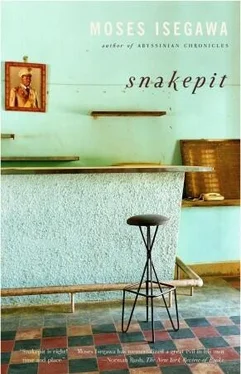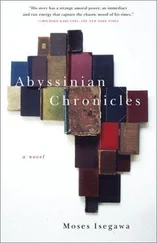She woke in the morning with fear in the pit of her stomach, and dressed to go to work with doubt plaguing her mind. She arrived at her office feeling nervous, as if she expected a bullet in the back, and she started sorting papers, useless files. Hers was a dead department, hollowed by the fact that rural roads had not been repaired in ages. She sat in her office waiting, she did not know for what, drinking tea, staring out the window at passersby, the trees, at nothing. Her hopes seemed to grow dimmer by the day. She was now afraid that the General would take his revenge and strike back at her. In what way? She didn’t know. She kept thinking about her disappeared father and her failure to find him. She thought about her family and the fact that the General had run them off. She saw him cocking guns, asking her to shoot him. She would gladly shoot him now, for she believed that he had made Bat disappear. And robbed her of her hope. Her escape route. I have to get Bat back, she said out aloud. I have to get Bat back, I have to get Bat back, I have to. .
Things had changed at the Bureau. It had fallen into the hands of Amin’s tribesmen. She felt that if it hadn’t been for General Bazooka they would have killed her. She wanted to get out. She prayed for a miracle to find Bat and take him away from that other woman. Then I will walk safely into a secure future, she thought. It was still a dream. When frustration got the better of her, she picked up the phone and called Babit. Hearing her hold her breath or begging to be left alone empowered her, made her want to smash the receiver in her face, and erase her from Bat’s life. Calling her barren had at first been a slip of the tongue, but it was now a major weapon. A bazooka. She loved its soul-crushing potency. But why didn’t it drive her out of the house? When she got tired of harassing her, she would leave the dead office and roam the city looking for clues, flimsy leads to turn her into Bat’s saviour. A whore had been the first person to witness Jesus’ resurrection. Wouldn’t it be fantastic if I resurrected Bat out of the morgue?
THE SEARCH for Bat’s body began at midday on a rainy day with Sister, Babit, Tayari, Mafuta, the Professor, and Mr. and Mrs. Kalanda dressed in gumboots and raincoats and looking sombre as stormy weather. Afternoons were most convenient because one was sure that all dumpers had retired for their siesta. Now and then, bodies were dumped during the day, but then by the roadside, not deep in the forest where the group was headed. The “surgeon” the group had hired lived on the blind side of Mabira Forest, where most settlements were. The taxi van which brought the group stopped three kilometres from their final destination. They walked the muddy paths deeper into the forest, the trees above wetting their heads at a monotonous tempo.
The man lived in a small settlement of iron-roofed mud houses where children were playing inside, now and then one or two of them venturing into the rain and the red mud before dashing back indoors. The women were busy making the best of the soggy, muddy situation: cooking, cleaning, making sure their children did not stay out in the rain and catch fever. The man had been doing the job for a number of years and oozed with the confidence of an expert. These were in fact the boom years. He had begun by going to strip corpses of watches, rings, necklaces, clothes, any valuables the soldiers overlooked in their haste. Business had been good then because the victims of purges were mostly well-to-do people. Nowadays the soldiers had become wiser, hungrier. There were no more pickings, but the “surgeoning” was booming because of the dramatic rise in disappearances.
He was in his thirties, in the prime of his life, dressed in gumboots, jeans and a khaki shirt. He was a very average-looking fellow who could have passed for a teacher, a carpenter, or a driver if you found him walking on the street in his Sunday best, because of the air of calm and control he had about him. He had worked in a hospital morgue but had resigned over bad pay and decided to become self-employed. Hands sheathed in surgical gloves, a cigarette smouldering in his mouth, a flashlight dangling at his hip, he led the group into the forest.
“We are the only remaining true foresters. We care more about the forest than those trained to name the trees. We know where the animals are, where the people live. The name ‘surgeon’ does us an injustice,” he said at the beginning of the journey. But nobody had been in the mood to appreciate his sense of humour.
Light gradually dimmed, little insects started screeching, the forest floor felt thicker, softer, with dead leaves. The silence of the people seemed to make the ambience grimmer. When they had walked for a long time, a change in smell warned them of what lay ahead. As they drew nearer, the intensity rose, attaining a well-nigh physical pressure. The “forester” just marched on, a man in his element, a vulture surveying his domains. Suddenly, they were there. He turned around to face the group, as if asking them if they had the nerve to get down to business.
They were lying on their backs, on their sides, on their faces, some in coils like pricked millipedes. They were lying on top of each other, arms and heads over their neighbours, as if for fun or in ritual. They were lying singly, in twos, or in bigger bunches. They were dressed, naked, half-naked, sheathed only in coats of blood. There were those who seemed to have dozed off midway in prayer, rapture, boredom, disgust, dirtied as if they had failed to find the time or patience to wash. There were the faceless, the half-faced, the ones daring you to blow their cover. There were the fresh ones, with heat seeping out, and the stone-cold, with collapsed skin coats betraying bones. He guided them through them, past them, over them. With his gloved hand he pulled, exposed, unveiled, rearranged. He went on and on, a conductor musically twitching; a surgeon rubbing, probing; a history teacher selling faces, fictions. At the end of the exercise, with his bloodied glove and impassive face, he spread his hands like a priest at mass beckoning the congregation to embrace the Lord and told them that he could do no more for them. He wished them well, studying their faces, as if checking as to who had vomited most, who mourned most, who couldn’t wait to get away. He brought his hands down by his sides, shrugged his shoulders like a doctor who has failed in his duties, and one by one the group turned around ready to get out of the forest and go to meet another appointment, another fisher of men.
The final search occurred on a riverbank turning to marsh. In the razor-sharp bulrushes, as if looking for floating baskets with babies, water up to their shins, they surveyed bodies surfeited with sun and cordite. Most faces were upturned in supplication, mortification, abortion. Weeds and flowers bent in the wind and touched the faces, as though to wipe snot from runny noses, or pus from sick eyes. Here and there was a trouser-ripping erection, obscenely captured in death in all its glory. Tortured by hope and despair, they retired to spend the night listening to exploding bullets and grinding out new plans, better ways to handle the present and confront the unknown.
In the morning Mafuta, Sister and Babit went to Entebbe to attack the phone in search of the elusive British politician. Sister wanted to give him the news. She dialled away, working through a cacophony of honking faulty connections, snorting disconnections, and a ringing, echoing maze of failure sounds. It was towards late evening when she got somebody on the line. Emergency. A British emergency in Uganda? She tried to explain that it was about her brother. The woman at the other end wanted to cut her off. Too many weird callers these days, some threatening violence to her boss, some saying obscene things to her or anybody else answering the phone. Sister held her ground. She insisted; she demanded; she informed. She came away with the promise that the politician would call her back. She spent a bad night loaded with doubt, hope, fear.
Читать дальше











